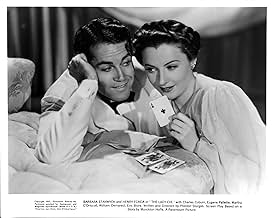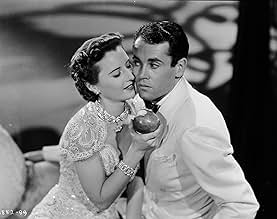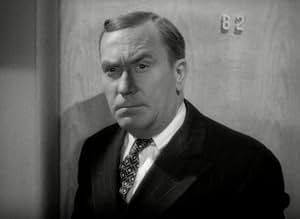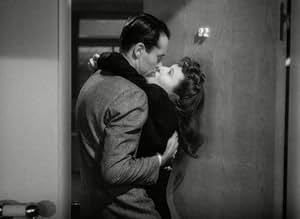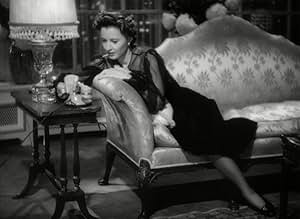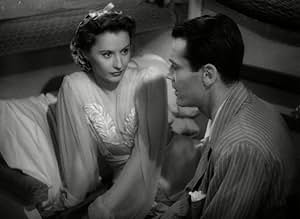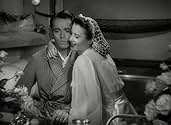IMDb-BEWERTUNG
7,7/10
24.728
IHRE BEWERTUNG
Ein Trio von erstklassigen Kartenhaien nimmt den sozial unbeholfenen Brauerei-Millionenerbe für sein Geld ins Visier, bis sich einer von ihnen in ihn verliebt.Ein Trio von erstklassigen Kartenhaien nimmt den sozial unbeholfenen Brauerei-Millionenerbe für sein Geld ins Visier, bis sich einer von ihnen in ihn verliebt.Ein Trio von erstklassigen Kartenhaien nimmt den sozial unbeholfenen Brauerei-Millionenerbe für sein Geld ins Visier, bis sich einer von ihnen in ihn verliebt.
- Regie
- Drehbuch
- Hauptbesetzung
- Für 1 Oscar nominiert
- 5 Gewinne & 1 Nominierung insgesamt
Abdullah Abbas
- Man with Potted Palm
- (Nicht genannt)
Norman Ainsley
- Sir Alfred's Servant
- (Nicht genannt)
Mary Akin
- Passenger on Ship
- (Nicht genannt)
Sam Ash
- Husband on Ship
- (Nicht genannt)
Harry A. Bailey
- Lawyer
- (Nicht genannt)
Bobby Barber
- Ship's Waiter with Toupee
- (Nicht genannt)
Empfohlene Bewertungen
On the surface of it, THE LADY EVE is a delightfully shallow evening's entertainment. It's a clever little film, filled with great dialogue ("Don't be vulgar, Jean. Let us be crooked, but never common.") and eccentric characters, from the leading lady Jean (a marvellous Barbara Stanwyck) and her much-beleaguered main man Charlie Pike (Henry Fonda) down to the other con artists that make up Jean's circle, including her dad Harry (Charles Coburn), sidekick Gerald (Melville Cooper) and Sir Alfred McGlennan Keith (Eric Blore)... or just Pearlie for short. Charlie is heir to the Pike Ale fortune, and while on a cruise home from South America, Harrington father and daughter decide to take the hapless lad to the metaphorical drycleaners. What neither of them gambles on is a romance that was always in the cards for Jean and Charlie. But just as Jean is about to go 'straight' for Charlie, he discovers that his girlfriend is part of a con racket, and unceremoniously dumps her. Hurt and determined to get revenge for his cruel parting words, Jean initiates a farce as the Lady Eve Sidwich of the film's title and infiltrates Charlie's home and heart again. She quickly teaches him a lesson he'll never forget, just as she realises how much she really still loves Charlie.
Story-wise, then, it's no doubt that THE LADY EVE provides fine frothy entertainment. Pair that with the surreal touches added into the film by Preston Sturges (take for example the supposedly climactic scene in which Charlie repeats his words of love to Eve--Fonda never gets to play the scene straight, even though he has to maintain a stony face as his horse keeps butting into his speech... presumably to try to get him to stop talking!), and there's certainly plenty to keep one occupied as is. The film is, of course, a screwball comedy absolutely bent on throwing every possible obstacle it can into the path of its intended couple, coming up with more twists than you expect...
However, thanks largely to the brilliant writing and direction provided by Sturges, it actually also plays very close and very insightfully to the theme of what Stanley Cavell calls 'remarriage comedy'. The idea behind this is that legal or religious marriages, the 'first' marriages of the couple concerned in such comedies, are actually sham marriages. It isn't saying 'I do' or signing a piece of paper that makes a marriage a marriage; it's the behaviour of the couple, their own endorsement, that makes it a true marriage. This theme is reflected in, for example, THE AWFUL TRUTH, which sees Lucy and Jerry Warriner divorcing (their first, sham marriage didn't work out) but getting back together again for a true, albeit not yet legalised, union. The same theme pervades THE PHILADELPHIA STORY. Preston Sturges very skilfully and effectively--but subtly!--brings this theme to his film as well. Eve and Charlie are married, but it is only when Charlie asks Jean for forgiveness and vice versa is it possible for the fact that they are married (to each other, as poor Charlie does not know!) to become significant and actually positively affirmed.
This isn't the only interesting point the film makes while appearing to be little more than a fluffy piece of entertainment--when Charlie breaks Jean's heart, she tells him, "The best [girls] aren't as good as you think they are and the bad ones aren't as bad. Not nearly as bad." She sets out to prove this, both in her fabricated 'good-girl' persona as Eve (later revealed to have had many MANY suitors) and her real 'bad-girl' con-artist self Jean (who has a soft heart and a love for Charlie that proves to be one of her virtues). Practically everyone in the film has (at least) two names by which they're known: Jean/Eve, Charlie/Hopsie, Muggsy/Murgatroyd/Ambrose, Harry/Colonel Harrington, Pearlie/Sir Alfred and so on. This suggests, quite rightly, that people are complicated complex beings, and that appearances often have nothing to do with reality. It also brings the film's story to a head--Jean and Charlie can never be happy together until Charlie can accept Jean as she is, and this he presumably will have learnt through his short, disastrous 'marriage' to Eve.
Stanwyck and Fonda are really outstanding in this film. Stanwyck's job is to persuasively depict two characters, and then effect a blend of the two of them in the final minutes of the story, and she pulls off both the sassy, confident Jean and the elegant, British Eve perfectly. It's not hard to imagine Charlie falling hard for Jean, even with her hard-headed casing of the joint and her prospective competition (appropriately deemed second-rate) for his affections... a very memorable scene involving her make-up mirror and a narrative voice-over, the latter of which is used to great effect in the lead-up to the 'romantic scene and horse' bit which follows later in the film. Fonda has the apparently easier job of appearing mostly colourless and stodgy as he spends most of his screen time reacting to situations created by both Jean and Eve, but I contend that it must really take quite a lot of true acting ability to execute the pratfalls that he does without making Charlie such a wimp that you can't imagine Jean still wanting him at the very end. Though not quite as effective as Cary Grant, who has to do the same thing in the face of Katharine Hepburn's breathlessly effusive Susan Vance in BRINGING UP BABY, Fonda still brings a sweet charm to his role as the not-at-all-slick, often befuddled Charlie Pike. Add these two classy performances to that given by the able supporting cast, and THE LADY EVE is not just well-scripted and directed, but also very very well-acted indeed.
So, watch this film the first time just for fun--be charmed by the characters, by the dialogue, by the actors, by everything. Then watch it again to realise just how subtly and effectively THE LADY EVE actually makes several comments on marriage and on love. I highly recommend getting your hands on the Criterion Collection DVD, which has (aside from a tremendous photo gallery and interview with Peter Bogdanavich and other special features) a fantastic, thought-provoking commentary by film critic Marian Keane--it most certainly got *me* thinking!
Great film, great entertainment, great message!
Story-wise, then, it's no doubt that THE LADY EVE provides fine frothy entertainment. Pair that with the surreal touches added into the film by Preston Sturges (take for example the supposedly climactic scene in which Charlie repeats his words of love to Eve--Fonda never gets to play the scene straight, even though he has to maintain a stony face as his horse keeps butting into his speech... presumably to try to get him to stop talking!), and there's certainly plenty to keep one occupied as is. The film is, of course, a screwball comedy absolutely bent on throwing every possible obstacle it can into the path of its intended couple, coming up with more twists than you expect...
However, thanks largely to the brilliant writing and direction provided by Sturges, it actually also plays very close and very insightfully to the theme of what Stanley Cavell calls 'remarriage comedy'. The idea behind this is that legal or religious marriages, the 'first' marriages of the couple concerned in such comedies, are actually sham marriages. It isn't saying 'I do' or signing a piece of paper that makes a marriage a marriage; it's the behaviour of the couple, their own endorsement, that makes it a true marriage. This theme is reflected in, for example, THE AWFUL TRUTH, which sees Lucy and Jerry Warriner divorcing (their first, sham marriage didn't work out) but getting back together again for a true, albeit not yet legalised, union. The same theme pervades THE PHILADELPHIA STORY. Preston Sturges very skilfully and effectively--but subtly!--brings this theme to his film as well. Eve and Charlie are married, but it is only when Charlie asks Jean for forgiveness and vice versa is it possible for the fact that they are married (to each other, as poor Charlie does not know!) to become significant and actually positively affirmed.
This isn't the only interesting point the film makes while appearing to be little more than a fluffy piece of entertainment--when Charlie breaks Jean's heart, she tells him, "The best [girls] aren't as good as you think they are and the bad ones aren't as bad. Not nearly as bad." She sets out to prove this, both in her fabricated 'good-girl' persona as Eve (later revealed to have had many MANY suitors) and her real 'bad-girl' con-artist self Jean (who has a soft heart and a love for Charlie that proves to be one of her virtues). Practically everyone in the film has (at least) two names by which they're known: Jean/Eve, Charlie/Hopsie, Muggsy/Murgatroyd/Ambrose, Harry/Colonel Harrington, Pearlie/Sir Alfred and so on. This suggests, quite rightly, that people are complicated complex beings, and that appearances often have nothing to do with reality. It also brings the film's story to a head--Jean and Charlie can never be happy together until Charlie can accept Jean as she is, and this he presumably will have learnt through his short, disastrous 'marriage' to Eve.
Stanwyck and Fonda are really outstanding in this film. Stanwyck's job is to persuasively depict two characters, and then effect a blend of the two of them in the final minutes of the story, and she pulls off both the sassy, confident Jean and the elegant, British Eve perfectly. It's not hard to imagine Charlie falling hard for Jean, even with her hard-headed casing of the joint and her prospective competition (appropriately deemed second-rate) for his affections... a very memorable scene involving her make-up mirror and a narrative voice-over, the latter of which is used to great effect in the lead-up to the 'romantic scene and horse' bit which follows later in the film. Fonda has the apparently easier job of appearing mostly colourless and stodgy as he spends most of his screen time reacting to situations created by both Jean and Eve, but I contend that it must really take quite a lot of true acting ability to execute the pratfalls that he does without making Charlie such a wimp that you can't imagine Jean still wanting him at the very end. Though not quite as effective as Cary Grant, who has to do the same thing in the face of Katharine Hepburn's breathlessly effusive Susan Vance in BRINGING UP BABY, Fonda still brings a sweet charm to his role as the not-at-all-slick, often befuddled Charlie Pike. Add these two classy performances to that given by the able supporting cast, and THE LADY EVE is not just well-scripted and directed, but also very very well-acted indeed.
So, watch this film the first time just for fun--be charmed by the characters, by the dialogue, by the actors, by everything. Then watch it again to realise just how subtly and effectively THE LADY EVE actually makes several comments on marriage and on love. I highly recommend getting your hands on the Criterion Collection DVD, which has (aside from a tremendous photo gallery and interview with Peter Bogdanavich and other special features) a fantastic, thought-provoking commentary by film critic Marian Keane--it most certainly got *me* thinking!
Great film, great entertainment, great message!
OK so the plot of The Lady Eve doesn't make a lot of sense, but why should it? It's fast, funny, and offers two great stars--Barbara Stanwyck and Henry Fonda--great roles. Although both stars were better known for their dramatic roles, Fonda and Stanwyck breeze thru this romp in classic style.
Fonda plays a rich goofus who falls for Jean (Stanwyck) onboard an ocean liner but she turns out to be a crook so he dumps her. To get even, she pretends to be the British Lady Eve and crashes his Connecticut manor. He falls for her again.
Surprisingly racy lines for a 1941 comedy and a totally wonderful supporting cast make this a must see. Charles Coburn plays Stanwyck's father. Eugene Palette and Janet Beecher are Fonda's parents. William Demarest is the valet. Eric Blore is the faux earl. Melville Cooper is Coburn's valet. Robert Greig is the butler. Torben Meyer is the purser, and Martha O'Driscoll is a maid. The film is full of other faces familiar from Preston Sturges comedies: Jimmy Conlin, Al Bridge, Julius Tannen, Robert Warwick, and Robert Dudley. Also look for Bess Flowers, Barbara Pepper, and Luis Alberni.
First and foremost, however, are Stanwyck and Fonda. They made 3 films together and they are perfect Sturges types. He is still and gawky but basically good. She is slightly bad and sexy but basically good. It would be easy to replace Fonda in this film with another Sturges favorite, Joel McCrea, or replace Stanwyck with Veronica Lake (the star's of his Sullivan's Travels) and this would have been a good film. But Fonda and Stanwyck make this edgier than Lake and McCrea could have made it. Indeed if Fonda had been the star of Sullivan's Travels, that film would be in the top ten on all film fans' lists.
But The Lady Eve is just terrific. It's a comedy that runs hot on pacing, great lines, and the charisma and chemistry of two major stars. How odd that this classic comedy received only one Oscar nomination--for writing. Preston Sturges would be nominated for writing 3 times and win for The Great McGinty. He was never nominated as a director. The Lady Eve, Sullivan's Travels, The Palm Beach Story, Miracle of Morgan's Creek, and Hail the Conquering Hero remain cornerstones of 40s comedy.
The Lady Eve is a must see for fans of great comedy and the likes of Sturges, Stanwyck, and Fonda!
Fonda plays a rich goofus who falls for Jean (Stanwyck) onboard an ocean liner but she turns out to be a crook so he dumps her. To get even, she pretends to be the British Lady Eve and crashes his Connecticut manor. He falls for her again.
Surprisingly racy lines for a 1941 comedy and a totally wonderful supporting cast make this a must see. Charles Coburn plays Stanwyck's father. Eugene Palette and Janet Beecher are Fonda's parents. William Demarest is the valet. Eric Blore is the faux earl. Melville Cooper is Coburn's valet. Robert Greig is the butler. Torben Meyer is the purser, and Martha O'Driscoll is a maid. The film is full of other faces familiar from Preston Sturges comedies: Jimmy Conlin, Al Bridge, Julius Tannen, Robert Warwick, and Robert Dudley. Also look for Bess Flowers, Barbara Pepper, and Luis Alberni.
First and foremost, however, are Stanwyck and Fonda. They made 3 films together and they are perfect Sturges types. He is still and gawky but basically good. She is slightly bad and sexy but basically good. It would be easy to replace Fonda in this film with another Sturges favorite, Joel McCrea, or replace Stanwyck with Veronica Lake (the star's of his Sullivan's Travels) and this would have been a good film. But Fonda and Stanwyck make this edgier than Lake and McCrea could have made it. Indeed if Fonda had been the star of Sullivan's Travels, that film would be in the top ten on all film fans' lists.
But The Lady Eve is just terrific. It's a comedy that runs hot on pacing, great lines, and the charisma and chemistry of two major stars. How odd that this classic comedy received only one Oscar nomination--for writing. Preston Sturges would be nominated for writing 3 times and win for The Great McGinty. He was never nominated as a director. The Lady Eve, Sullivan's Travels, The Palm Beach Story, Miracle of Morgan's Creek, and Hail the Conquering Hero remain cornerstones of 40s comedy.
The Lady Eve is a must see for fans of great comedy and the likes of Sturges, Stanwyck, and Fonda!
A second viewing of this after many years has confirmed it as truly one of the great comedies. I don't think Sturges was ever better (although I haven't seen all his films), and certainly he was never blessed with a better star pairing than Fonda and Stanwyck, plus his usual wonderful array of character comedians in the supporting roles. A double bill of Eve with "Hail the Conquering Hero" reveals that, while both still have their charms, Eve can still have a theatre rocking with laughter, while Hero leaves them a bit cold with its descent into Capra-cornish patriotism and mother love.
The Lady Eve has one of my favourite performances ever from Henry Fonda, showing that his grave sincerity could serve screwball comedy equally as well as Fordian moral uplift. He takes some of the funniest deadpan pratfalls this side of Buster Keaton.
And of course Stanwyck is a delight ... and Charles Coburn ... and Eugene Pallette ... and William Demarest ... and ... and ... ssshhh ... Eric Blore.
If you've never seen it, give yourself a treat
The Lady Eve has one of my favourite performances ever from Henry Fonda, showing that his grave sincerity could serve screwball comedy equally as well as Fordian moral uplift. He takes some of the funniest deadpan pratfalls this side of Buster Keaton.
And of course Stanwyck is a delight ... and Charles Coburn ... and Eugene Pallette ... and William Demarest ... and ... and ... ssshhh ... Eric Blore.
If you've never seen it, give yourself a treat
This is an interesting combination of talents and material that works very well, thanks most of all to Preston Sturges's ability to create a distinctive feel to his pictures. "The Lady Eve" has many of the elements familiar to screwball comedy, and yet it is something a little different, a little more than the oddball characters and comical plot developments.
Barbara Stanwyck has quite an interesting role that allows her at times to assume several different personas. She shows good versatility, and effectively brings out the different sides of her character's nature. Henry Fonda works better than you would expect in such a comic picture. He is wisely used as a straight man most of the time, and even his occasional stiffness actually fits the role.
Much of the supporting cast gets only limited opportunities, but they are generally good also, especially Charles Coburn, who is perfectly cast as Stanwyck's shifty father.
There are many amusing moments, yet often with a current of humanity underneath. Sturges and the cast keep the laughs coming while also making sure that you care about the characters.
Barbara Stanwyck has quite an interesting role that allows her at times to assume several different personas. She shows good versatility, and effectively brings out the different sides of her character's nature. Henry Fonda works better than you would expect in such a comic picture. He is wisely used as a straight man most of the time, and even his occasional stiffness actually fits the role.
Much of the supporting cast gets only limited opportunities, but they are generally good also, especially Charles Coburn, who is perfectly cast as Stanwyck's shifty father.
There are many amusing moments, yet often with a current of humanity underneath. Sturges and the cast keep the laughs coming while also making sure that you care about the characters.
Henry Fonda and Barbara Stanwyck light up the delightful Preston Sturges comedy, "The Lady Eve." Stanwyck plays a dual role as a con artist who falls for a mark, Henry Fonda, on board a ship and then, angry with his rejection of her, reappears in his life later as a member of the British upper class - you got it, the Lady Eve.
Fonda is hilarious as a clueless child of privilege. Always the most subtle, internalized of actors, his facial expressions are priceless, as is his slapstick.
The funniest scene takes place on a train when, as the train races along the tracks, Eve recounts her various love affairs while Fonda becomes more and more flummoxed.
Betty Grable got a lot of publicity for her legs, but Stanwyck's were the best, shown to great advantage here, as is the rest of her gorgeous figure. She's fantastic in this and has great chemistry with Fonda.
Stanwyck always creates a whole character, and she does here as well (in fact, two of them) as a woman who is smart, independent, vulnerable in love, and conniving when angry.
A great comedy, not to be missed.
Fonda is hilarious as a clueless child of privilege. Always the most subtle, internalized of actors, his facial expressions are priceless, as is his slapstick.
The funniest scene takes place on a train when, as the train races along the tracks, Eve recounts her various love affairs while Fonda becomes more and more flummoxed.
Betty Grable got a lot of publicity for her legs, but Stanwyck's were the best, shown to great advantage here, as is the rest of her gorgeous figure. She's fantastic in this and has great chemistry with Fonda.
Stanwyck always creates a whole character, and she does here as well (in fact, two of them) as a woman who is smart, independent, vulnerable in love, and conniving when angry.
A great comedy, not to be missed.
Wusstest du schon
- WissenswertesIt was hibernation season during the shoot, and Emma the king snake was always sleeping while also shedding her skin. Needless to say, she was very uncooperative.
- PatzerWhen Jean is looking at Charles in the mirror, what she sees is the right way round instead of reversed. (This can be seen by looking at the cover of Charles' book.)
- Crazy CreditsA very large cartoon snake displays the opening credits while twining around an apple tree.
- VerbindungenEdited into Spisok korabley (2008)
Top-Auswahl
Melde dich zum Bewerten an und greife auf die Watchlist für personalisierte Empfehlungen zu.
- How long is The Lady Eve?Powered by Alexa
- What year or era is this movie set in? Was it considered a modern movie in its time?
- What book is Charles reading on the boat?
Details
- Erscheinungsdatum
- Herkunftsland
- Sprache
- Auch bekannt als
- Las tres noches de Eva
- Drehorte
- Produktionsfirma
- Weitere beteiligte Unternehmen bei IMDbPro anzeigen
Box Office
- Weltweiter Bruttoertrag
- 15.142 $
- Laufzeit1 Stunde 34 Minuten
- Farbe
- Seitenverhältnis
- 1.37 : 1
Zu dieser Seite beitragen
Bearbeitung vorschlagen oder fehlenden Inhalt hinzufügen

Oberste Lücke
By what name was Die Falschspielerin (1941) officially released in India in English?
Antwort

